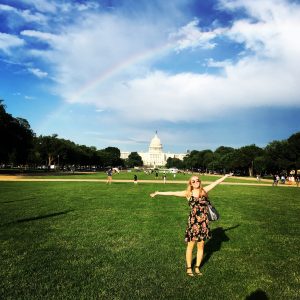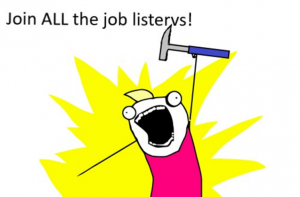December 20, 2018
Internships in the U.S. Capital
Posted by AGU Career Center
Washington, DC (Internship) Universe: Policy Positions and Beyond in the U.S. Capital

I’ve heard that you can be an intern in Washington, DC, on a virtually indefinite basis. After 6 months working in the U.S. capital city, my preliminary findings so far confirm the idea.
In my time in Washington, I’ve held two internships. My first internship was at the American Geosciences Institute (AGI) working in geoscience policy, and my second position was at American Geophysical Union (AGU), working on education and career programming in the Talent Pool department. Coming to Washington as a recent graduate, I still wasn’t quite sure what I wanted my career to look like going forward. And while the plethora of career options in Washington seemed overwhelming, these internship experiences have helped clarify my career goals and added and strengthened skills with which I can pursue these goals in the future. For any other early-career scientists who, like me, are still finding their career path, I’d wholeheartedly recommend either internship.
AGI: Geoscience Policy
At AGI, I was introduced to the legislative process and its interaction with the U.S. Executive Branch and federal agencies. I tracked federal activity, attended hearings on Capitol Hill, and wrote articles on federal proceedings relevant to the geosciences. I was immersed in the geoscience policy world, joining policy coalitions and working alongside AGU and GSA associates on policy events. Through this position, I particularly appreciated that I was able to specialize in policies that specifically relate to geoscience issues and interests. Compared with other general policy internships, like the ones on Capitol Hill, the fact that this internship was paid didn’t hurt either. Good news for people set on working in the U.S. Capitol: It looks like Congress’s days of free labor will soon be over.
AGU: Talent Pool
At AGU, I appreciated the high level of autonomy I was afforded as an intern. I was able to take point on managing Fall Meeting education and career events, setting my own internal deadlines and organizing communications and project timelines. Because of the highly collaborative environment of the Talent Pool program, I was also able to explore a variety of Talent Pool operations, and my daily work involved substantial internal and external communication experience. As an added bonus, I worked alongside people whose job it is to know all about the myriad of career pathways possible for Earth and space scientists. This personal resource has been remarkably helpful to an early-career scientist who had ejected himself out of academia and into the unknown, like the New Horizons probe being launched out of Earth’s orbit into the Kuiper Belt.
Applications for winter AGU Talent Pool internship positions are now open.
General Advice:
- DC-centric listservs like Brad Traverse and Tom Manatos are great resources for policy and other Washington jobs, but you will have to pay a low monthly subscription fee.
- Start applying for other positions at the beginning of a 3-month internship. Twelve weeks come and go a lot sooner than you think, especially if you are applying through USAJOBS.
- Your supervisors are typically a great resource; don’t be afraid to ask them questions regarding your career after the internship. If they are good mentors, keep in touch even after the internship is over.
If I could give one piece of advice to a fellow early-career geoscientist, like myself, it would be this: As long as you’re building relevant skills and learning more about what types of work best suit your strengths, you are still making progress toward a fulfilling long-term position.
I now can see a “light at the end of the tunnel” as far as my DC internship cycle is concerned. My diverse internship experiences have helped clarify my desired career and work environment. I can see the skills I’ve gained coming together to make me a successful hire for a long-term job that matches my interests and abilities. Besides, I’m a geoscientist. When it comes to caverns and lava tubes, tunnels are kind of up my alley.
Check out a 2017 survey comparing skills development through policy, education, and science writing internships at AGI and AGU.
Bryce Koester, B.A., Earth and Environmental Studies with honors, Vanderbilt University, Former policy intern at American Geosciences Institute, Former Talent Pool intern at American Geophysical Union, Member of the Paleontological Society Governmental Affairs Committee



 On the Job is an AGU blog, that provides career advice and workforce guidance to geoscience students, early-career and established professionals who are interested in pursuing professional enrichment.
On the Job is an AGU blog, that provides career advice and workforce guidance to geoscience students, early-career and established professionals who are interested in pursuing professional enrichment.